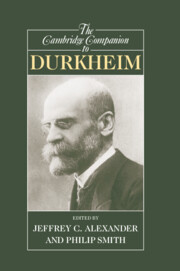Book contents
- Frontmatter
- 1 Introduction: the new Durkheim
- Part I: Life, context, and ideas
- Part II: Symbols, rituals, and bodies
- Part III: Solidarity, difference, and morality
- 12 Durkheim, solidarity, and September 11
- 13 Is Durkheim a class analyst?
- 14 Durkheim’s society revisited
- 15 Beyond solidarity? Durkheim and twenty-first century democracy in a global age
- Further reading
- Index
12 - Durkheim, solidarity, and September 11
from Part III: - Solidarity, difference, and morality
Published online by Cambridge University Press: 28 April 2008
- Frontmatter
- 1 Introduction: the new Durkheim
- Part I: Life, context, and ideas
- Part II: Symbols, rituals, and bodies
- Part III: Solidarity, difference, and morality
- 12 Durkheim, solidarity, and September 11
- 13 Is Durkheim a class analyst?
- 14 Durkheim’s society revisited
- 15 Beyond solidarity? Durkheim and twenty-first century democracy in a global age
- Further reading
- Index
Summary
Jeffrey Alexander (1987) has vigorously defended the centrality of the classics in the social sciences in opposition to a more “natural science” optic regarding the progress of a scientific discipline. It is part of the training of sociologists to internalize the classics (Alexander 1987: 20) as much as they internalize the methods and rules of evidence required to established empirical facts, which are the “stuff” of the natural sciences. The classics, thus, provide frames for finding, sensing, and mapping the major dimensions of the social order (Wrong 1994).
To add to Alexander's discussion, I suggest that we see a two-way interaction between the classics and our contemporary situation. On the one hand, the classics are heuristic in sensitizing us to a broader view and a broader search of social structures and patterns in our contemporary social world. They provide us with a “perspective” which may be otherwise missing simply because we may be so immersed in our situation as to be, in a certain sense, myopic of broader operative features. On the other hand, our contemporary situation may bring to light elements or dimensions that undergird the classic text, helping to understand (that is, to stand under) the text; ultimately, to bring out features of the text that may have remained obscure. Thus, to bring out a new understanding of our contemporary situation, to make sense of what might be otherwise an unwieldy set of data, and to make new sense of an accepted text is really a dialectical process of theorizing, from the past to the present and from the present to the past.
- Type
- Chapter
- Information
- The Cambridge Companion to Durkheim , pp. 305 - 321Publisher: Cambridge University PressPrint publication year: 2005
- 10
- Cited by



